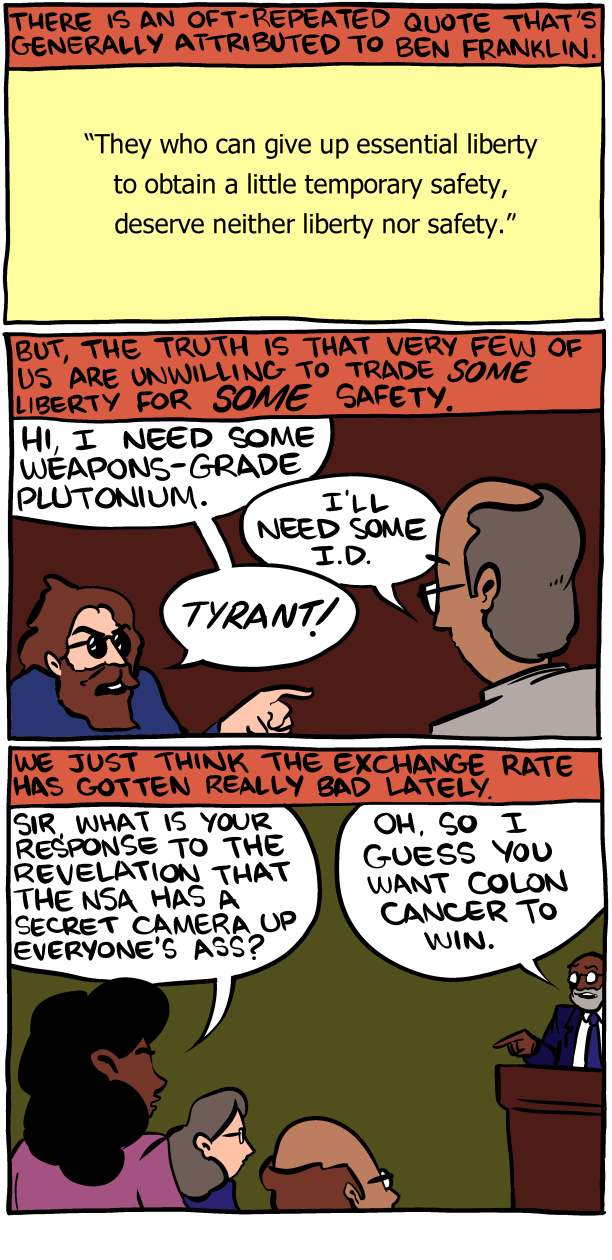"Bitcoin has value a tool: you can use it to near instantly make payments across the world, with almost no transaction fees."
In my initial post, I clarify the properties of value, why I believe a source of value outside of trade is necessary to at least rest assured with a given currency, and why I believe that Bitcoin (aka BTC) does not have such a source of value. There are many responses to this point, citing claimed sources of value, but I believe them to be almost always erroneous. Here, I will focus on the above claim of Value From Transferability.
Disagreements about the economic viability of BTC can usually be split into two areas: "Does Bitcoin have consumable value?" and "Does it even matter? (I mean, look at the inflated price of gold!)". With respect to the claim of Value From Transferability, I will only argue against the former. Arguments against the latter can be made independent of this particular claimed source of value, and will be done in future posts.
Some specifics on the nature of value
Most importantly, certain things are valuable because they're directly consumed. The "shininess factor", with regard to things like silver (aka Ag). This is based on personal preference, and its market exchange rate is as reliable as the existence of that preference among independent individuals across the economy. Other things are valuable as tools to help produce or obtain things that have shininess. Still other things have properties, currency features, that help preserve its own value, assuming it has value to begin with. Durability of Ag is a canonical example.
However, all action in the real world is speculative. Even when I value something for shininess, I speculate that I will in fact enjoy it. But this is not speculation on others' behavior, so it is not relevant to this discussion. More importantly, if I'm a holder of Ag for the purposes of exchange, its value from durability depends on another person down the line valuing its shininess, making the value from durability speculative. And if I'm talking about a commodity without any shininess attributes, that is circulating as currency regardless, any properties such as durability has arbitrary speculation, ie I'm effectively guessing people will continue to take it, because they did yesterday.
Problem?
So with that in mind, let's revisit the Value From Transferability claim: BTC has value, because it's useful, because it can extremely cheaply and reliably transfer value across the world. Seems plausible enough. I want to make a transaction of Ag to somebody across the world in exchange for a vintage postage stamp I wish to collect, but there are expensive wire charges involved. However I find that I am able to exchange some Ag for some BTC in order to send that BTC across the world for miniscule fees (and the fees are not zero). Thus, the BTC demonstrably is valuable to me in that moment.
So what is the problem? In short, it is begging the question. If the BTC system were a means of cheaply transferring something with established value, with BTC as the vessel, then yes, that would give BTC a sustainable value. However the BTC system is a means of transferring BTC. Any value inherent in it is established after, and independent of, the transfer. The claim of Value From Transferability shouldn't depend on BTC already having an established value from some other source, otherwise the claim is superfluous. Thus, we are left with BTC having value because it helps me transfer value, that value again being in the form of the ability to transfer value, ad infinitum.

Value From Transferability is a Currency Feature, but without any speculation on somebody appreciating its shininess. Exactly how much value is at the end of this chain of events is completely arbitrary. Thus, in reality, as with essentially every source of value of BTC, it comes down to arbitrary speculation on people's behavior. Again, whether that is an acceptable basis for a currency is the subject of another discussion, but this conclusion should suffice to dispel the claim that Value From Transferability changes this basis.
Preferences in detail
Let's start with the fact that an exchange can take place when two entities have opposite relative valuations of two objects:
V1(A ) < V1(B)
V2(B ) < V2(A)
Where VX is the person X's valuation of the given object.
Base case: Pure arbitrary speculation
Supposing you were to describe a scenario where, as I claim, people choose to use BTC purely based on arbitrary speculation. For example, let's say there is a current exchange rate of 10oz Ag/BTC. However, there is a common fear among certain people that Ag will soon take a dive. But BTC has been holding steady for some time, so it is preferred by those people. Suppose the cost of each BTC transaction is .01 BTC. What would this scenario look like?
The first person prefers to trade in their Ag for BTC at the current exchange rate:
V1(8.1oz Ag) < V1(.81 BTC)
This same person prefers to trade 0.81 BTC for a certain product, P1. To properly demonstrate opposite relative valuations, which is necessary for a trade, we also note that they prefer 0.8 less than either of these:
V1(.8 BTC)
< V1(.81 BTC)
< V1(P1)
The next person prefers to trade P1 for .8 BTC, and trade that for another product, P2. 0.79 BTC is shown, again, to demonstrate opposite relative valuations:
V2(P1)
< V2(.79 BTC)
< V2(.8 BTC)
< V2(P2)
And so on:
V3(P2)
< V3(.79 BTC)
< V3(P3)
Note that the objects are colored to highlight the opposite relative valuations, which allow for the objects to be exchanged, as explained in the beginning of this section.
There's nothing setting the exchange rate of BTC here other than each actor's valuation of their desired product, and their speculation that the next entity will part with it for that much.
Transferring value via BTC
Now let's examine the claim of Value From Transferability, which implies that the above is inaccurate. Suppose I am holding 10oz Ag, which I am willing to exchange for the postage stamp. The stamp vendor is willing to part with it for 8oz Ag so that she can buy a phone. The traditional wire transfer fees are 2oz Ag. The expenses to me would total 10oz Ag, so I am willing to make this transaction.
But then, before I pick up the phone to call Western Union, the stamp vendor hears about BTC from the phone vendor. She explains to me that I can exchange 8.1oz Ag for .81 BTC, send it to her, and I will lose only 0.01 BTC in transaction fees. She can exchange the remaining .8 BTC for the phone, closing the deal. Very directly put, the value of BTC to me here is that it has saved me 2oz Ag. Seems on the surface like the BTC has real use value, but let's examine further.
Since I would be willing to trade 10oz Ag for the stamp, I value 10oz Ag less than I value the stamp. Assuming I could trivially give away silver if I really wanted to, I reasonably value 10oz Ag more than 8.1oz Ag. Here Vm denotes my valuation:
Vm(8.1oz Ag) < Vm(10oz Ag) < Vm(Stamp)
I value .81 BTC more than 8.1oz Ag, because with the Ag I can't directly obtain the stamp. However, I want the BTC for no reason other than to obtain the stamp in an exchange, therefore I value the stamp even more:
Vm(8.1oz Ag) < Vm(.81 BTC) < Vm(Stamp)
Now I am speculating the following, where Vs denotes the stamp vendor's valuation:
Vs(Stamp) < Vs(.8 BTC) < Vs(Phone)
The stamp vendor would, in turn, be speculating that the phone vendor could use the BTC to obtain something he wants:
Vp(Phone) < Vp(.79 BTC) < Vp(Pp)
Now let's restate the above, rearranging some terms, and adding some self-evident terms (valuing more BTC over less):
Vm(8.1oz Ag) < Vm(.81 BTC)
Vm(.8 BTC) < Vm(.81 BTC) < Vm(Stamp)
Vs(Stamp) < Vs(.79 BTC) < Vs(.8 BTC) < Vs(Phone)
Vp(Phone) < Vp(.79 BTC) < Vp(Pp)
This takes the exact form as the arbitrarily speculative base case:
V1(8.1oz Ag) < V1(.81 BTC)
V1(.8 BTC) < V1(.81 BTC) < V1(P1)
V2(P1) < V2(.79 BTC) < V2(.8 BTC) < V2(P2)
V3(P2) < V2(.79 BTC) < V3(P3)
Despite my making a choice of BTC over Ag, the incentives resulting in exchanges are fundamentally the same as the arbitrarily speculative base case. BTC is still valued only by speculating on other people's willingness to take it in exchange for desired products.
But saving 2oz Ag in transaction fees seems to be valuable, how does that not factor in? Well, just as with the base case, the perceived disutility of Ag has no impact on the perceived utility of BTC in obtaining desired products.
A further observation: the fact that using 0.8 BTC can save me 2oz Ag is based on the particular exchange rate. If the exchange rate were 1oz Ag/BTC, it would take 8 BTC for the same effect. In other words, the amount of utility in a given amount of BTC is based entirely on its exchange rates.
Transferring value via a voucher
This may seem altogether counterintuitive. Am I effectively saying that money transfer systems are not fundamentally valuable? No, a transfer system is valuable as a tool, so long as what is being transferred already has value. Let's imagine a product that does transfer value, then.
Supposing that, instead of BTC, I found a wire service where I could spend 9oz Ag for a voucher, which I will denote by v8, which I could transfer half way across the world. 9oz Ag is cheaper than 10oz Ag, so I'll take it.
Vm(9oz Ag) < Vm(10oz Ag) < Vm(Stamp)
Vm(9oz Ag) < Vm(v8) < Vm(Stamp)
Vs(Stamp) < Vs(v8) < Vs(8oz Ag) < Vs(Phone)
Similar rules thus far apply here as with BTC. However, instead of the stamp vendor speculating about a phone vendor, she speculates about the preferences of the wiring company:
Vw(8oz Ag) < Vw(v8, R)
Where R is the reputation retained by the company for honoring its voucher.
Putting this all together, my valuation of v8 is based on the speculation that the stamp vendor will speculate that the wiring company will want to maintain its reputation by honoring the v8. Such a voucher system could not be implemented using BTC because no company has control over the exchange rate. They each must themselves speculate on how other companies would treat BTC. Honoring the v8 on the other hand only takes agreement on the part of one company.
There is no need to speculate on the preferences of further people because the v8 is destroyed at the point of redemption. Unlike with BTC, there's an anchor on the exchange rate, somewhere between 8 and 9oz Ag. I could even trade the v8 in a market, where people would value it based on the utility of transferring 8oz Ag and their trust of the company to redeem it.
Conclusion
Looking at the claim of Value From Transferability, it seems that some BTC proponents see it as a currency feature of BTC, and yet believe that it is inherently useful to the point where it gives it a "shininess factor". I hope that I've shown that shininess does not follow from a currency feature, because shininess happens after the commodity stops being a currency. Alternately, they may see it as a tool to transfer existing value. And indeed, that would make BTC sustainable. I hope that I have shown, however, that only arbitrarily speculative value is transferred. Thus, this feature merely cuts down on losses incurred in transferring BTC, while BTC's value ultimately stems from arbitrary speculation.







.jpg)

.jpg)










